Daily Vocabulary Words: List of Daily Used Words in Leading International Newspapers
Hi there. Welcome to this special section @ Wordpandit.
Our endeavour here is very simple: to highlight important daily vocabulary words, which you would come across in leading newspapers in the country. We have included the following newspapers in our selection:
• The New York Times
• The Washington Post
• Scientific American
• BBC
• The Guardian
• Psychology Today
• Wall Street Journal
• The Economist
We are putting in extensive work for developing your vocabulary. All you have got to do is be regular with this section and check out this post on a daily basis. This is your repository of words that are commonly used and essentially, we are posting a list of daily used words. Hence, this has significant practical application as it teaches you words that are used commonly in leading publications mentioned above.
Visit the website daily to learn words from leading international newspapers.
WORD-1: Entangled
CONTEXT: I’d entangled him in a mess that he did not have to be a part of.
SOURCE: New York Times
EXPLANATORY PARAGRAPH: Imagine playing with a ball of yarn and it gets all twisted and knotted up with your toys. This complicated mix of knots and loops is called being “entangled.” It means being caught up in something in a way that makes it difficult to escape or become free.
MEANING: Involved in something complicated or difficult to escape (verb).
PRONUNCIATION: en-TAN-guhld
SYNONYMS: involved, caught up, entwined, intertwined, snarled
USAGE EXAMPLE:
1. The dolphin became entangled in the fishing net.
2. She found herself entangled in a complex legal dispute.
3. His emotions were deeply entangled with hers.
4. The more they discussed, the more entangled the issue became.
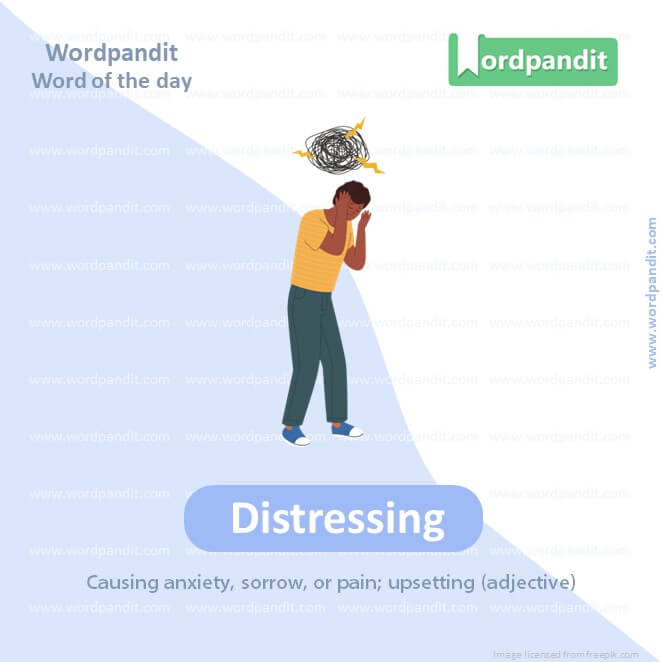
WORD-2: Distressing
CONTEXT: I read articles by psychologists that recommended never lying to your children, even about distressing events; they cautioned that it’s important to dole out the truth in a limited, age-appropriate manner.
SOURCE: New York Times
EXPLANATORY PARAGRAPH: Imagine hearing news that makes you feel really sad and worried, like finding out a friend is moving away. This kind of upsetting news is called “distressing.” It means causing anxiety, sorrow, or pain; upsetting.
MEANING: Causing anxiety, sorrow, or pain; upsetting (adjective).
PRONUNCIATION: dih-STRES-ing
SYNONYMS: troubling, upsetting, worrisome, disturbing, painful
USAGE EXAMPLE:
1. It was distressing to hear about the accident.
2. The news of the layoffs was very distressing to the employees.
3. She found the scenes in the movie quite distressing.
4. The family went through a distressing time during the illness.
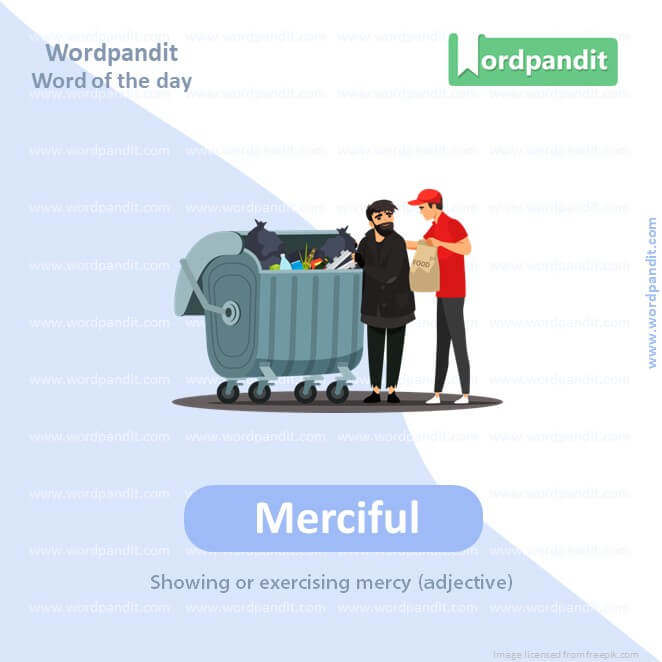
WORD-3: Merciful
CONTEXT: I’ve read reports of parents in war zones going to extreme lengths to hide the brutality of war from their children, even as they live it. Part of me thinks that this merciful lying is a biological instinct, that it’s somehow better for the survival of the species to allow our children to believe the world is better than it is.
SOURCE: New York Times
EXPLANATORY PARAGRAPH: Imagine someone forgiving another person instead of being angry or punishing them. This act of showing kindness and forgiveness is called being “merciful.” It means showing or exercising mercy.
MEANING: Showing or exercising mercy (adjective).
PRONUNCIATION: MUR-sih-ful
SYNONYMS: compassionate, lenient, forgiving, clement, benevolent
USAGE EXAMPLE:
1. The judge was merciful in her sentencing.
2. He was merciful towards his enemies, which earned him their respect.
3. It was a merciful act to end the animal’s suffering.
4. They prayed for a merciful outcome to their troubles.
WORD-4: Nebulous
CONTEXT: the summer of our planned trip came and went. My son didn’t notice, and I thanked his child brain’s nebulous sense of time for sparing me the need to explain.
SOURCE: New York Times
EXPLANATORY PARAGRAPH: Imagine trying to see through a thick fog where everything looks blurry and unclear. This unclear, vague condition is called “nebulous.” It means lacking clarity or being vague.
MEANING: In the form of a cloud or haze; hazy (adjective).
PRONUNCIATION: NEB-yuh-lus
SYNONYMS: vague, unclear, indistinct, fuzzy, murky
USAGE EXAMPLE:
1. His explanations were nebulous and confusing.
2. The rules of the game were somewhat nebulous to new players.
3. She had only a nebulous memory of her childhood.
4. The nebulous figure in the distance turned out to be a scarecrow.
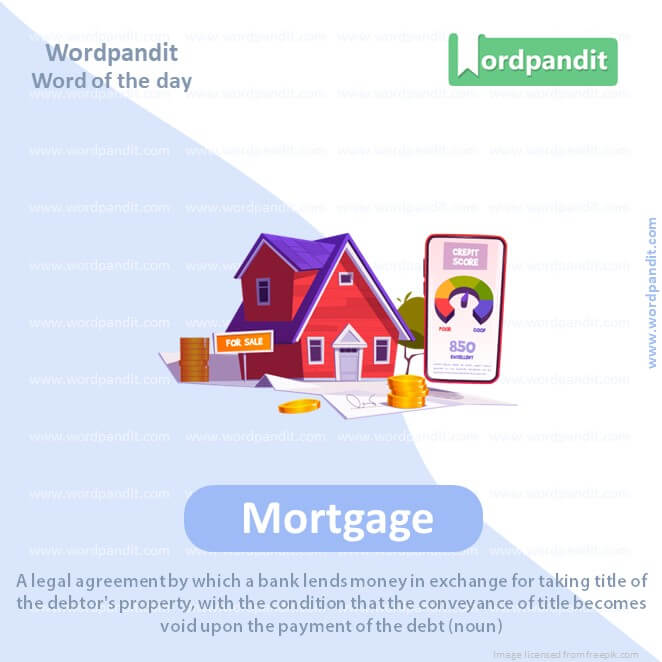
WORD-5: Mortgage
CONTEXT: As they are now, because it’s more expensive to, say, get a mortgage or some other kind of loan.
SOURCE: New York Times
EXPLANATORY PARAGRAPH: Imagine buying a house, but instead of paying all the money at once, you agree to pay a little bit every month for many years. This agreement that helps you buy your house is called a “mortgage.” It means a legal agreement by which a bank lends money at interest in exchange for taking title of the debtor’s property, with the condition that the conveyance of title becomes void upon the payment of the debt.
MEANING: A legal agreement by which a bank lends money in exchange for taking title of the debtor’s property, with the condition that the conveyance of title becomes void upon the payment Of the debt (noun)
PRONUNCIATION: MOR-gij
SYNONYMS: loan, home loan, charge, lien, deed of trust
USAGE EXAMPLE:
1. They took out a 30-year mortgage to buy their first home.
2. Paying off the mortgage was their biggest financial goal.
3. Mortgage rates have fluctuated significantly this year.
4. They are considering refinancing their mortgage to get a better interest rate.
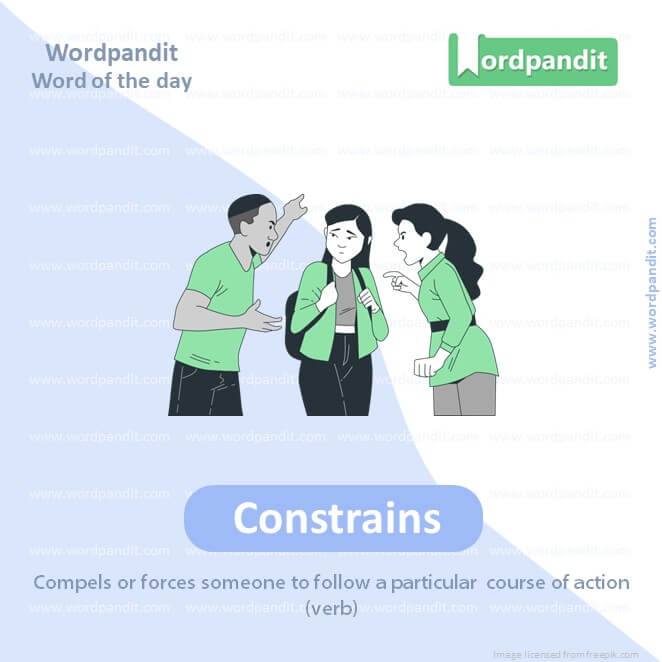
WORD-6: Constrains
CONTEXT: The debt burden also constrains future administrations, which have to worry so much about paying off the debt they are less able to invest in programs that might increase growth, reduce child poverty, educate children, house people or respond to emergencies.
SOURCE: New York Times
EXPLANATORY PARAGRAPH: Imagine being in a small room where you can’t stretch your arms out fully. This limitation that prevents you from moving freely is called being “constrained.” It means severely restricted in scope, extent, or activity.
MEANING: Compels or forces someone to follow a particular course of action (verb).
PRONUNCIATION: kun-STRAYNZ
SYNONYMS: restricts, limits, confines, controls, compels
USAGE EXAMPLE:
1. The contract constrains them from working with other companies.
2. Lack of funding constrains their options for expansion.
3. He felt constrained by social norms and expectations.
4. The narrow bridge constrains the flow of traffic.
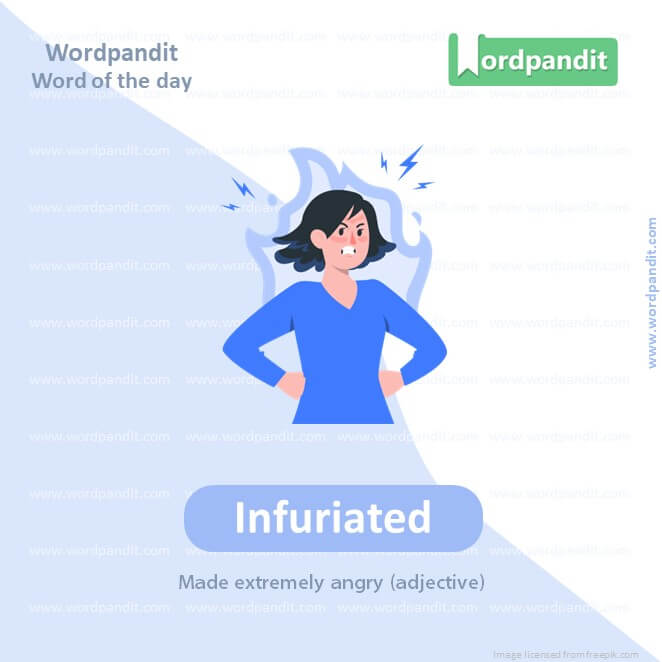
WORD-7: Infuriated
CONTEXT: he House speaker, reversed a position that he’d previously held, banded with Democrats and infuriated some of the loudest, meanest and most vengeful members of his party — that’s Marjorie Taylor Greene you hear wailing in the wings — to pass a $95 billion aid package for Ukraine, Israel and Taiwan last weekend.
SOURCE: New York Times
EXPLANATORY PARAGRAPH: Imagine someone deliberately ruining your favorite drawing. This action might make you extremely angry. This intense anger is what being “infuriated” means. It involves being extremely angry, often to the point of losing control.
MEANING: Made extremely angry (adjective).
PRONUNCIATION: in-FYOO-ree-ay-ted
SYNONYMS: enraged, incensed, fuming, outraged, livid
USAGE EXAMPLE:
1. She was infuriated by the unfair treatment she received.
2. The delay in the delivery of the package infuriated him.
3. The team was infuriated by the referee’s unfair decision.
4. Misinformation being spread online infuriated the community.
WORD-8: Premonitions
CONTEXT: it’s an important counter to the very worst of our pessimism, a reminder not to let our premonitions of doom utterly consume us and become self-fulfilling prophecies.
SOURCE: New York Times
EXPLANATORY PARAGRAPH: Imagine having a strong feeling that something bad is going to happen before there’s any actual sign of trouble. This uneasy feeling about the future is called a “premonition.” It means a strong feeling that something is about to happen, especially something unpleasant.
MEANING: A strong feeling that something is about to happen, especially something unpleasant (noun).
PRONUNCIATION: prem-uh-NISH-uhns
SYNONYMS: forewarning, intuition, hunch, presentiment, inkling
USAGE EXAMPLE:
1. He had a premonition that something bad was going to happen during the trip.
2. She ignored her premonitions and went on the journey anyway.
3. His uneasy premonitions turned out to be justified when the storm hit.
4. Premonitions of the disaster spread panic throughout the village.
WORD-9: Stinted
CONTEXT: They haven’t stinted on the finish either. There’s a soft gloss and polish to the place that would, I think, lend a comely glow to my corpse in repose.” (James Bullock, Edmonton, Alberta)
SOURCE: New York Times
EXPLANATORY PARAGRAPH: Imagine being given a task to paint a huge wall but only being given a small amount of paint. You might have to use less paint than you really need to finish the job. This act of using less than necessary is called “stinting.” It means being frugal or sparing, often excessively so.
MEANING: Supplied an ungenerous or inadequate amount of something (verb).
PRONUNCIATION: STINT-ed
SYNONYMS: skimped, scrimped, economized, restricted, saved
USAGE EXAMPLE:
1. They stinted on food during the long journey to save supplies.
2. The budget cuts have forced us to stint on quality.
3. Despite the need, he stinted on support to his team.
4. She never stinted on effort, regardless of the task at hand.
WORD-10: Tumbling
CONTEXT: Sahota throws so many disparate parts into this story that it’s something of a miracle when they begin to coalesce — like a box of gears and springs tumbling down the stairs and coming to rest in the shape of a clock.
SOURCE: New York Times
EXPLANATORY PARAGRAPH: Imagine climbing a hill and suddenly losing your footing, causing you to roll and fall down the hill in a rapid, uncontrolled manner. This action is called “tumbling.” It means falling quickly and without control.
MEANING: Falling and rolling suddenly in a helpless or uncontrolled way (verb).
PRONUNCIATION: TUM-bling
SYNONYMS: falling, rolling, plummeting, dropping, crashing
USAGE EXAMPLE:
1. The prices in the stock market began tumbling unexpectedly.
2. He slipped on the ice and went tumbling down the driveway.
3. The books tumbled off the shelf during the earthquake.
4. The child was tumbling on the mats during gymnastics class.
Vocabulary Synonyms
In the intricate weave of language learning, ‘vocabulary synonyms’ emerge as a key element that adds depth and variety to expression. These different words with similar meanings enrich our vocabulary, enabling us to communicate with precision and clarity. However, grasping ‘vocabulary synonyms’ successfully warrants a systematic approach.
When approaching ‘vocabulary synonyms’, context is your compass. Engage with various reading materials like novels, newspapers, and digital content to explore and understand how these synonyms are used in different situations. This exposure will fortify your comprehension of ‘vocabulary synonyms’ and their usage nuances.
Employing memory-enhancing techniques can cement your grasp on ‘vocabulary synonyms’. Employing flashcards is an effective method where one side contains the word you know, and the other side has its synonyms. Also, creating mind maps, linking the known word to its various synonyms, can be an engaging way to learn ‘vocabulary synonyms’.
To master ‘vocabulary synonyms’, take an active role in application. Regular conversations, written communications, digital interactions – all of these offer ample opportunities to utilize learnt synonyms. This practice refines your application and accelerates internalization of ‘vocabulary synonyms’.
Embracing language exchange platforms or engaging with native speakers can provide invaluable feedback on the usage of ‘vocabulary synonyms’. This interaction can further enhance your understanding of the cultural idiosyncrasies of word usage.
In conclusion, learning ‘vocabulary synonyms’ is a rewarding pursuit that adds layers of complexity to your language skills. A thoughtful blend of diversified resources, memory tools, practice, and interactive learning can make the task of mastering ‘vocabulary synonyms’ an enjoyable and fruitful journey. Every synonym learnt paints your vocabulary with different shades of understanding, making your language canvas all the more vivid and spectacular!







